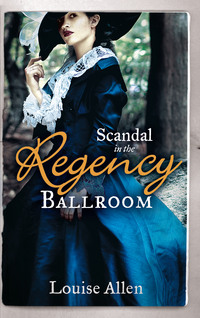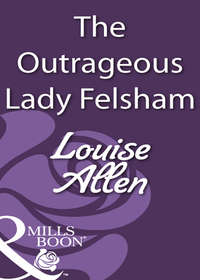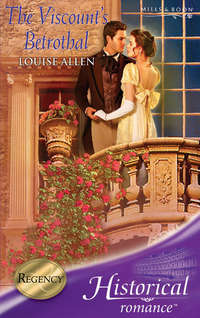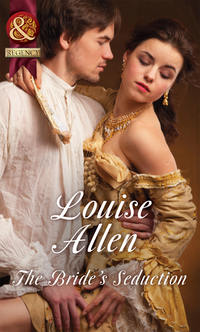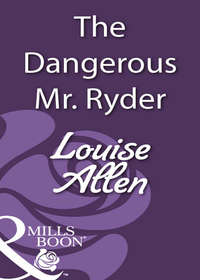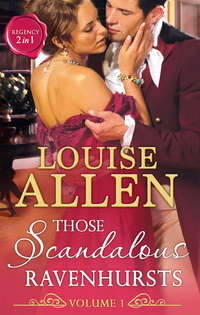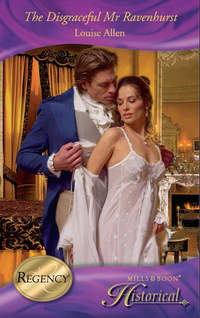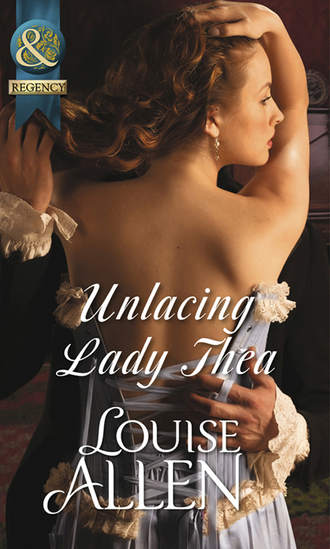
Полная версия
Unlacing Lady Thea
‘You said that you would be for ever in my debt.’ She did not make the mistake of smiling triumphantly.
‘I think I was thirteen at the time,’ Rhys said. ‘That is a very long time to remember a debt.’
‘Surely a gentleman never forgets one, especially to a lady.’ His eyes flickered over her appalling clothes, but he refrained from comment. ‘You have three choices, Rhys. Take me with you, leave me to my own devices in London or send me back to Papa.’ Thea smiled to reduce the bluntness of her demand. ‘Think of it as one last adventure. Or don’t you dare?’
He shook his head at her, then winced as his eyes crossed. ‘Do not think you are going to provoke me that way. I am twenty-eight, Thea, much too old for that nonsense.’
Rhys was not too old for anything, she thought as she concentrated on keeping her face open and ingenuous. He looked perfect for one last adventure, one last dream. ‘Please?’
It had never failed before. She had no idea why, of all the group of godchildren who had spent their long summers with Lady Hughson, she was the one who could always wheedle Rhys into doing anything she asked. Her, ordinary little Althea, not the other boys, not even Serena, the blue-eyed beauty he had fallen in love with.
‘I must be mad.’ She held her breath as he took a long swallow of brandy, his Adam’s apple moving in the muscled column of his throat. ‘I’ll take you. But you had better behave, brat, or you’ll be on the first boat home.’
Chapter Two
Rhys might have been foxed, but he could still organise his affairs with an autocratic authority. Hurrying upstairs to get changed, a sleepy maid at her heels, Thea recognised the development of the charm she remembered from years before. Then he would smile, explain, persuade—and things happened as the young Earl of Palgrave desired them. Everything except his marriage.
As an adult he still smiled, but he had no need for persuasion, it seemed. What his lordship ordered, happened. Now a travelling carriage was waiting behind the chaise in which she sat, clad in the plain, crumpled gown and cloak she had pulled from her portmanteau. A startled housemaid had received an unexpected promotion to lady’s attendant and was chattering excitedly with Rhys’s valet, Hodge, while the remainder of the luggage was packed into the carriage.
Thea twitched the side blind to make certain it was securely down, although there was no one in the dawn-lit street to see her inside the vehicle, let alone recognise her with the thick veil that covered her face. She yawned and wriggled her toes, relishing the thick carpet and the comfortable squabs after the Spartan stagecoach. Her new maid—Molly, Polly?—would join her in the chaise and Rhys would travel in the carriage with his valet, she assumed.
That was a good thing. She had not realised quite what a shock to the system this fully grown Rhys would be. Other than some distant glimpses when their paths had crossed while she was doing the Season, her last memories were of a youthful, trusting twenty-two-year-old standing white-faced at the altar as his world fell about his ears. After that he had been in London and, even when she was there, too, following her come-out, the paths of a wealthy, sophisticated man about town with no interest in finding a bride did not cross those of a young lady in the midst of the Marriage Mart.
The door opened and a footman leaned in. ‘Excuse me, ma’am, but shall I put your seat into the sleeping position?’ As he spoke he tugged a section of the padded facing panel away to reveal the darkness of the compartment that jutted out at the front of the vehicle, then he fitted the panel into the gap in front of the seat. She had heard about sleeping chaises, but had never travelled in one before.
‘No, thank you.’ She felt too tense to lie down. The maid deserved some rest after being dragged from her sleep to attend to her so she could use the facility.
The door opened again, the chaise dipped to the side as someone put their foot on the step. ‘Rhys?’
‘Not sleeping?’ Shaven but heavy-eyed, he climbed past her, shrugged out of his coat and slid down the bed the footman had created, his booted feet disappearing into the void. ‘Wake me when we stop for breakfast.’ He closed his eyes and curled up on his side. ‘Or for highwaymen.’
Without his coat Thea had an unimpeded view of the back of his head, his broad shoulders, the quite admirable lines of long thigh muscles and—she made no effort to avert her eyes—a firm, trim backside.
She stared for a long minute, being only human and female, then fixed her gaze on the postilions as the chaise lurched into motion. Oh, yes, indeed, her childhood friend had grown up. She felt rather as if she had whistled for a friendly hound to come to her side and had found instead she had summoned a wolf. He might be Rhys, but he was also a male. An adult male. With, she recalled, a reputation.
She brought to mind the sight of him in a box at Covent Garden Theatre, plying a beautiful woman with champagne, and hearing the whispers of the married ladies in her party. He had snatched that ladybird from the keeping of Lord Hepplethwaite and the displaced lord had blustered about calling him out—and had then recalled Rhys’s reputation with a rapier.
After a few minutes Thea lowered the blind. It was easier on her nerves to see where they were and, if she was looking out of the window, then she was not watching the man slumbering by her side. He was snoring a little, which was not surprising after all he had drunk, she supposed. The sound was oddly comforting.
A glint of water showed her they were crossing Westminster Bridge, the new gaslights disappointingly extinguished. But the view downriver was as dramatic as when Wordsworth had written about it. ‘The City now doth like a garment wear the beauty of the morning...’ she murmured.
Beside her Rhys sighed as if in protest at the sound of her voice and turned over, his eyes tightly closed in sleep. His hair was fashionably cropped, but one dark lock fell over his forehead, a vivid reminder of the youth she had known. Thea reached out to brush it back, then stopped, her ungloved hand a fraction above the slightly waving strands. They rose to meet her fingertips like the pelt of a cat that had been stroked until its fur crackled.
Thea folded her hands in her lap. Some things were better left as dreams and memories. Some things were safer as girlhood follies. After a few minutes she drew the road guide from her reticule, where she had placed it in case she had needed to set out by herself, and unfolded the map.
They were heading into Southwark. As she had since she had begun this journey, she began to count off milestones in her head. Gathering everything she needed, undetected. Escaping from the house to the King’s Head—not the closest inn, but one where she would not be recognised, despite the extra hour’s walking it added to her flight. Taking the stage. Finding a hackney carriage to Rhys’s house and then, the most difficult part of all, persuading him to take her with him.
Would he have agreed if he had not been drinking or if he had recognised that she was a grown woman now? She glanced down at his face, pillowed on his bent arm. Those blue eyes were closed, the veiling lashes a dark fringe. The bend in his nose was more visible from this angle and his lips moved slightly with his soft snores. There was a small scar just below his ear. That was new.
Thea wrenched her attention back to the map and the view from the window. Houses were thinning out; ahead was Deptford, full of history. According to her guidebook, it was where Sir Francis Drake was knighted and where Tsar Peter the Great stayed when he visited England. She watched eagerly for signs of the glamorous past and was sadly disappointed by crowded, dirty streets. They rattled over cobbles, the chaise jerked to a halt several times but Rhys slept on, much to her relief. When he woke, sobered and doubtless with a crashing hangover, would he change his mind about her?
The road began to climb towards Blackheath. Wake me for highwaymen, Rhys had instructed. Well, if they were to find any, this was a likely spot. She found she could not become very apprehensive, not on a clear June morning. More worrying was wondering where he had given the order for the first change. If it was too close to London, then there was the risk he would send her back. They rattled past the Sun in the Sands, the Fox under the Hill and the Earl of Moira as the road kept climbing. Shooter’s Hill, she supposed, and relaxed a little.
Now they were slowing. Ahead she could see buildings, swinging inn signs. The postilions turned into the Red Lion’s courtyard and ostlers ran out to make the change as the landlord strode across the yard towards them, attracted no doubt by the coat of arms emblazoned on the carriage doors.
Thea dropped the window. ‘Shh! His lordship is sleeping,’ she whispered to the man. Hodge appeared beside him and she murmured, ‘Please have something if you need to, but don’t wake his lordship.’
Hodge showed no surprise, but then, he must have been aware of the state his master had been in when he boarded the chaise. He nodded and went into the inn, her maid on his heels. Thea closed the window and sat on guard, her veil in place, jealously watching for anyone who might disturb Rhys’s sleep. But after the arrival of a stagecoach, an altercation between two stable dogs and the shrill laughter of a kitchen maid flirting with an ostler all failed to do more than make him bury his head more firmly in his arms, she began to think he might sleep all morning, and began to doze herself.
Hodge opening the door woke her with a start. He passed her a mug of coffee and a napkin wrapped around a bread roll stuffed with bacon and glanced at his unconscious master.
‘Does he always sleep like this?’ Thea whispered.
The valet shook his head. ‘No, my lady.’ He took the mug when she had gulped the cooling coffee and closed the door softly, leaving her more than a little disturbed. Did Hodge mean he always drank that much and therefore slept heavily?
It had shocked her to find Rhys castaway and to see him toss off brandy as though it were lemonade. The rumours immediately after the fiasco of his wedding day were that he was a man who did not care, who had been glad to lose the responsibility of a wife and that he had plunged into a life of rakish dissipation.
He had cared, of course. She had seen his face in that first shock of betrayal; she had felt his fingers shake as she had pressed her pocket handkerchief into them, had felt his body rigid with pain when she had risked a brief hug. But then he had turned from the altar rail, a rueful smile on his lips, confessed that he had suspected the impending elopement all along and that he wished the scandalous couple happy.
For a man not given to falsehood, it was an impressive performance. It confused the gossipmongers, deflected some of the opprobrium from Serena and Paul and, she supposed, it salved Rhys’s pride not to appear a victim, someone to be sorry for.
When she had been in London for her first Season the only news she could discover of him was that he had steadied, taken his seat in the House of Lords and was managing his estates with a firm hand—but that he had a shocking reputation with women. Far from seeking a new bride, he flirted as if it was a form of elegant warfare, while keeping a string of mistresses who were, she gathered from the whispers, both beautiful and expensive. He was either not invited to the entertainments thought suitable for innocent young ladies, or he chose not to attend them.
The mothers of hopeful daughters were outraged: a young, wealthy, handsome earl should be setting up his nursery. Preferably with one of their girls, any of whom had been better brought up than that flighty Lady Serena Haslow. If Lord Denham would stop indulging in the pleasures of the flesh and the gaming room long enough, he would soon come to his senses and marry one of them.
The chaise rattled out of the yard and turned east towards Dartford. No one was forcing Rhys to go on this European trip. A few months ago, with the Continent at war, he could not even have contemplated it. So why was he going now, and why had she sensed such equivocal feelings about it the night before?
* * *
The bed, unaccountably bumpy, suddenly tipped. Half awake, Rhys grabbed for the edge, missed it and slid down until his booted feet hit some obstacle. Boots in bed? A gentleman always takes his boots off, at the very least. ‘Where in Hades...?’
‘This is the West Hill down into Dartford. The route guide warns it is uncommonly steep.’ The matter-of-fact voice jolted him into a wakefulness that the discomforts of his bed had not achieved.
‘Thea?’ Rhys sat up, shoved the hair out of his eyes and groaned at the sunlight. If this was a dream, it was an uncommonly uncomfortable one. ‘What the devil are you doing in my chaise?’
‘You said I might come with you to the Continent. Surely you weren’t so foxed last night that you cannot recall promising?’ Pin neat, drab in mud-brown wool, as ordinary as a London sparrow and three times as real, she regarded him with what appeared to be disapproval.
‘I’d hoped it was a nightmare. And what are you looking at me like that for?’ He lifted the section of padded board and slotted it back into position so he could sit. ‘My mouth feels like the floor of a cockpit.’
‘I am not surprised—you were positively castaway last night. I suggest you tell the postilions to stop here and have some breakfast. The rest of us ate at Shooter’s Hill.’
To retort that he was in charge of this journey and would make the decisions where to stop was to plunge back into the bickering of their childhood. Not that Thea had ever bickered. Or whined, come to that. She merely widened those unremarkable hazel eyes until he felt he had somehow disappointed her. And he did want something to eat and a quart of black coffee and then, with any luck, someone would hit him over the head so he could forget this headache in merciful oblivion.
Rhys dropped the window, leaned out and yelled, ‘Next decent inn!’
‘That will be the Bull.’ Thea frowned at her road book.
‘Never mind inn names, what the devil am I going to do about you?’ He must have been beyond foxed to give in to the girl. Vague memories of an awful suit of male clothing swam into his memory.
‘Take me to Godmama.’ She regarded him through eyes suddenly narrowed with suspicion. ‘As you promised.’
‘You took advantage of me,’ Rhys retorted.
‘Do women often take advantage of you?’ she enquired sweetly.
‘When my luck’s in,’ Rhys muttered and Thea laughed. How could he have forgotten that wicked gurgle of laughter? He bit his lip to stop himself smiling back at her. ‘This is an improper conversation and an utterly improper situation. If it ever gets out, you’ll be ruined.’ He squinted at her. ‘You aren’t a child any longer.’ Was she? She looked about seventeen, if he was generous.
‘No, I am not. And as for being ruined—’ Thea shrugged as the chaise slowed. ‘Good. Then Papa will stop trying to marry me off to devious, fortune-hunting... I mean, then I can have the freedom to live my life as I want to and not dwindle into an old maid.’
What is the matter with her? Every other girl wants a husband, full stop. Why must Thea be so contrary? ‘Is that before or after your father shoots me?’ he enquired as they stopped and an ostler hurried up. Rhys opened the door. ‘No, we do not need a change of horses, but I want breakfast.’
‘So do I, now I think about it.’ Thea hopped down before he could offer his hand. ‘A bacon roll and warm coffee were not very sustaining.’
She had her thick veil down, so he could find no reason to object, but when she returned from, he presumed, finding the privy, he wedged a chair under the door handle of the private parlour.
‘Very wise,’ Thea observed, taking her seat. ‘If this was a stage farce, someone would burst through the door just as I removed my veil to eat. And, of course, by hideous coincidence they would know me very well and have a fatal penchant for gossip. Papa would arrive with a horsewhip....’
‘Do you see many farces?’ Rhys refilled his cup and added sugar. He needed all the strength he could get.
‘Not these days,’ Thea said, and sliced the top off an egg with undue force. Eggshell fragments splintered, Rhys winced. ‘Papa knows perfectly well that being kept away from London and the galleries and the theatres and the libraries is a torture. I am so looking forward to Paris.’
Rhys told himself that it was unmanly to whimper. ‘Perhaps you have a friend somewhere in Kent or Sussex? Someone you can stay with?’
‘You promised.’ And he had. Being drunk was no excuse; a gentleman should be able to hold his liquor. A gentleman never broke his word. And he owed her. Not for that lock-picking incident that he vaguely recalled coming up last night, but for years of friendship culminating in that moment in the church when she had slipped him her handkerchief, had looked at him with a world of understanding in her eyes for his pain, had given him a brief hug.
Thea had said nothing and had broken the contact almost immediately, as though she knew that too much sympathy would break him. The sixteen-year-old girl had offered him the only thing she could: her understanding and a calm presence that stopped him falling apart. That clear-eyed look told him that she trusted him to do the right thing and, somehow, he had.
What would have happened if she had not been there? Would he have given chase, called out his best friend? Put a bullet in him and left three lives in ruin instead of just his own?
‘Yes, I did, didn’t I? All right, I won’t go back on it.’
‘Thank you.’ Her hand shook a little as she lifted her cup, but otherwise she gave no sign that she had feared his refusal.
She always was a courageous little thing. Rhys poured more coffee so she wouldn’t know he’d noticed that tremble and felt a pang of guilt. He should have kept in touch. But gentlemen did not write to young girls.
‘Why were you—?’ Thea broke off. ‘Nothing.’
‘Why was I so drunk last night? Damned if I know. Twelve months suddenly seemed a hell of a long time to be away and I started having doubts about whether I really wanted to do it, whether it was just a whim. I’d told myself I deserve a holiday before—’ he almost did not finish the sentence, but then this was Thea and he’d always been able to tell her anything ‘—before I look for a wife next Season.’
And I despise myself for snatching at Bonaparte’s defeat as an excuse to put off that search for another year, and that’s why I was drinking. Coward. You should have dealt with those memories. There was little risk history would repeat itself; it was safe enough to seek to marry. His reason knew it, but apparently his emotions did not. It seemed there were some things he could not confess to Thea after all.
‘You always have a plan,’ she said, so coolly that he was taken aback. But what did he expect? That she would gasp in shock that he could forget Serena?
‘And that involves getting back on the road now. I expect to be in Dover at half past four. That will give us an hour to get the carriages loaded and still catch the tide.’
‘You are taking the carriages to France? How?’ Her voice was oddly muffled behind the veil as she replaced her bonnet. Had he upset her somehow?
‘I’ve hired a ship. I do not intend roughing it.’
‘Excellent.’ Thea’s voice held nothing but approval. He had obviously been mistaken. ‘I do so approve of luxury. And that means much more room for the shopping.’
‘Shopping?’ The Thea he remembered had no interest in shopping. But then, she had only been a girl and a tomboy at that. Looking at that disastrous gown, he shuddered to think what her idea of shopping entailed. Oh, well, her stepmother would soon sort out her wardrobe before her come-out. The vague memory of her saying she had been out for several Seasons floated into his aching head. And offers, and some man she was supposed to marry... No, surely not.
‘Of course. Shopping is the entire point of Paris.’
This time he did not care how weak it sounded. Rhys whimpered.
Chapter Three
Dartford, Greenhithe, Northfleet. They travelled the next five miles in virtual silence, both of them, it seemed to Thea, adapting to their new relationship as travelling companions. Rhys had the excuse of his hangover as well, of course. She almost suggested they stop at the next apothecary’s shop for a headache remedy, but this was a grown man beside her, not a boy. The very last thing she wanted to do was mother him.
‘What has put you to the blush?’ he asked without preamble.
She wished she had resumed her veil, but it hardly seemed friendly, not while they were travelling through open country. ‘I was thinking about a man.’ After all, she had always been able to tell Rhys everything. Almost everything.
‘Really?’ Rhys stopped slouching in his corner and regarded her quizzically. ‘A very romantic man, by the look of those pink cheeks. Fallen in love with the drawing master?’
‘No.’ He obviously could not stop thinking of her as a sixteen-year-old. ‘Not the drawing master and no one romantic. Men do not woo me romantically. They check that I am not a complete ninny-hammer, assure themselves that I have all my own teeth and do not giggle and then they trot off and talk to Papa about the size of my dowry and whether he can assure them my mother’s family will never make themselves known.’
‘Thea, give it a chance. Just because you haven’t taken yet it doesn’t mean you won’t get a perfectly reasonable proposal or two.’
‘Rhys, I have not taken in three Seasons. I am not a beauty. I am not pretty. I am not even interestingly eccentric in my looks. I am perfectly ordinary. Average height, average face, ordinary eyes, mouse-brown hair which does not cascade into tumultuous waves to my waist when I take it down.
‘If any man wrote poetry to my eyebrows I would fall about laughing and suggest he bought eyeglasses. When I do laugh no one compares it to the trill of a lark or the ripple of running water. I can sing and play the piano adequately and no one is so foolish as to ask for an encore.’
Rhys looked rather daunted. ‘But you—’
‘If you say I have a wonderful sense of humour, I will lose all respect for you,’ she warned. ‘Such a cliché.’
‘Well, you do have. But what I was going to say is that you have a talent for friendship.’
‘Oh.’ Now he had surprised her. What a very lovely thing to say. He had always been generous with his friendship—to her, to Paul who had betrayed him. She had not realised he had valued that in her and she was touched he recalled it now. ‘You have made me blush in earnest now,’ Thea said as lightly as she knew how. ‘I hope I am a good friend. But I do have a talent, and you will see what it is in Paris.’
‘Shopping?’
‘Not quite. Where are we now?’
‘Gravesend. We will change horses again at Strood. But you have evaded the subject. Who is this man that the mere thought of him makes you blush? Did he break your heart?’
He was teasing, that was all. Thea found her smile from somewhere. ‘Not deliberately. He had no idea of my feelings, you see, and besides, he was in love with someone else.’
‘He was?’
‘Is, I am sure. He was never the fickle sort. But don’t look so indignant on my behalf. It was ages ago.’
Simply a youthful tendre, the delicious, painful quivering of first love. Puppy love. That was behind her now, thank goodness. That girl and that young man no longer existed. Except in dreams, sometimes, but it would be too cruel to give up on dreams of love.
But they were dangerous things to hold on to. If she had realised that then, she would never have believed Anthony sincere when he began to court her, never have thought that she could find an adult love, prosaic and sensible perhaps, but true and honest nevertheless. It had made the disillusion even greater when she had overheard her father discussing the terms of her dowry, the extra lands he was adding to compensate Anthony for taking his plain, awkward daughter off his hands.


